Parenting in the Age of the iPhone: Raising Kids with Today's Technology
It’s a familiar scene: the family sitting at the dinner table, mom and dad scrolling through emails, while the kids are engrossed in their own iPads, texting and Facebooking other people across town while not looking at the person across the table.
As parents raising our kids in the Information Age, we struggle with how to embrace technology and all its amazing capabilities to make our lives easier; to keep our kids entertained and prepared for the connected world they’re entering. Yet at the same time, we’re faced with warnings of too much “screen time” and how it can affect children’s health and development.
How do we navigate these unchartered waters with our kids? And what tools are in place to help us?
We gathered a group of Boston-area moms and dads to join us for a dinner conversation about tech and parenting, from the “Wild West” of YouTube, to karate apps, to yes, even those strangely captivating surprise eggs.
Hear these parents’ stories about how they’re balancing their kids’ use of technology, and get our tech reporter Jennifer Pattison Tuohy’s tips for implementing parental controls and tech improvements to keep your kids safe and your connections strong.
Meet Our Guests



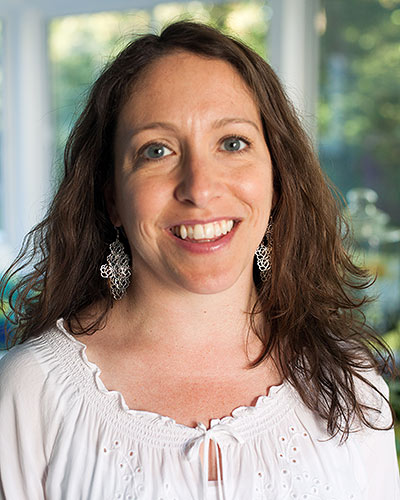





Making Technology a Part of the Family
Our devices have become part of our daily lives, from helping us manage our households to allowing us to work anywhere—to shaping our kids’ tech perceptions.
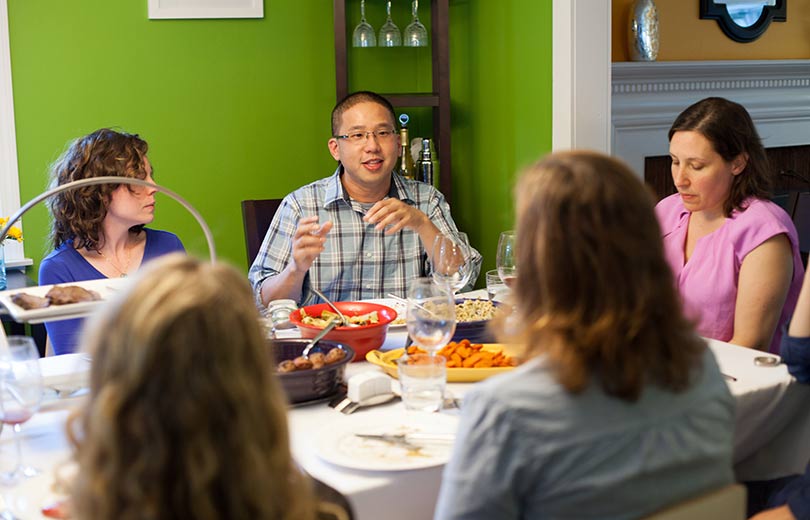
When did you introduce technology to your kids, and did you have reservations? Did your approach change after having another child?
Tung: With my son we made a conscious decision. I didn’t want him to have a lot of exposure to technology when he was young. I read a lot of articles that said, they watch (a screen), but they don’t really know what they’re looking at, and they can get addicted to the flashing images. So we said, ok, we’re not going to do it until he’s 3. We actually stuck to that. At times, it was a little tough for my wife. But then when my daughter came, that was out. Now that he’s watching it or using it, she’s just right there. Even as a younger kid, she wanted to be involved and interact with whatever he’s doing.
Kim: We didn’t consciously limit screen time with our first child, but we never had the TV running in the background and would only show her Signing Time DVDs to learn sign language. But with our second and third kids, they tended to watch what the older ones were seeing, and so for them, they got more screen time at an earlier age. Typically for a TV show, we’ll use On Demand which stops at the end of the episode. Now, my youngest will ask to watch a show on the iPad, banking on the fact that I’ll be distracted and not notice when she starts a new episode.
Zoe: Pre-kid, I was like, I will never turn the TV on. Meanwhile in the middle of the night, when he’s teeny, I’m watching re-runs of Law and Order. When he got older, I actually felt more in control with a tablet, because there were no ads. But he’s getting to the point where, he’s almost 4, so he’s like, ‘Oh, I can just switch out of this show.’ It started out with games, and drawing, and now he has shows. And he’s pretty quickly figured out how to move around within an app to get another show, which can be scary.
Carrie: I feel like when we had our babies the AAP (American Academy of Pediatrics) had something to say about it, and it was ‘nothing until age 2.’ [Editor’s Note: This is still the recommendation of the AAP, although they are set to release an update to their guidelines in October of 2016.] When you are pregnant or a dad about to have a baby, and you read these things you have no idea, especially with your first one, and you think, ‘Oh my god, I have to do exactly what they say!’ But if I hadn’t let my kids see screens until they were 2, I would have lost my ever-loving mind. I never would have had a shower.


On an iPad or iPhone, you can restrict access to some pre-set apps, set ratings limits for various online content (TV shows, apps, music, movies) and even designate which websites your child can visit.
- Go to Settings/General/Restrictions to explore all your options.
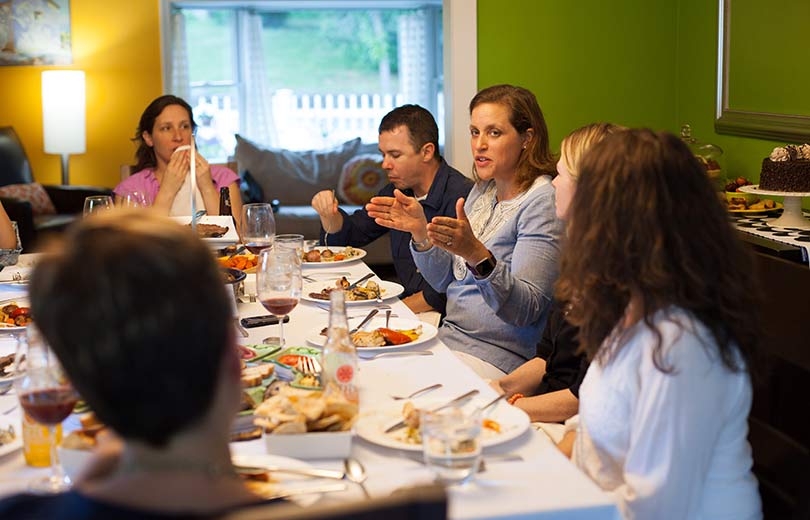
Do you think about the example we set with our own technology use?
Carrie: The iPhones came out when my daughter was about a year old, and I was like, ‘Oh, I can check my email while I’m at the farm!’ I could respond to a client but be with my kid. Now what’s better? Is it better for me to be stuck at home in front of a computer and not be able to take her places and do things with her? Or, better to be able to be out and about? So yeah, she was exposed to the iPhone from day one.
Zoe: I think a lot of us work in an industry where we kind of work all the time, and so, I’m in the office four days a week but when I come home I’m also kind of working, and on my day off, I’m also kind of working. My son sees me [on my phone] all the time because I’m working. So it wasn’t like I introduced it to him, but it was a fact of the life that I live. Technology is part of our lives, so it’s really hard or impossible to shield your child from it. The phone gives me the ability to be on the go with Fritz and also be tied into my work, which is a good and a bad thing, but it is what it is. It’s not like, ‘Oh let me see what happens if I feed him a strawberry right now.’ That you can literally control. This thing is more like a slow slide into it.
Lindsay: I think a lot about how much our kids see us on our phone. Whether it’s Facebook or texting or whatever ... I get a little uptight about that. I want to be the type of family where you get home and you check your cell phone at the door. I really just don’t want my kids to envision us always scrolling through our phones. I think there’s a lot to be said for just being in the moment, eye contact, experiencing things together, being present together. That’s still the biggest thing. I mean I’ll use the TV so that the household can function for a little while without chaos … so it’s more of a babysitter tool. I thought I would only use it for education. But I’m thirsty for better programs. I’m a little disappointed in myself for that when it’s like, ‘I need to do laundry, so here’s a TV show.’
Kim: When my husband is on his phone, he’s usually reading a book. However, at some point we realized the kids thought that every time he was on his phone he was playing Frozen Free Fall. I had to tell them no—he’s actually reading books! We think it’s important for our kids to see us reading, but they don’t necessarily see that with a device—our kids tend to think we’re doing what they would do on a phone, which is play a game or watch a video.
Jessica: My kids give me so much guilt about work. I realized just recently that both my kids, even my older daughter, think that every time I’m on my phone I’m working. They think I’m working ALL THE TIME! I’ll just be checking messages on Facebook. So I have to say, you know sometimes I’m just doing something for fun …
Carrie: My son will ask for a playdate and he’ll be like, ‘Can you text Elliot’s mom for a playdate?’ I don’t call, because we don’t use our phones for conversations. We can’t have a phone conversation—we start talking and it’s like “Aghh!” The kids interrupt everything, so we text everything.
Lindsay: I didn’t even start texting until three years ago. Carrie: Right, because how old is your child? Three! So you can’t have a phone conversation!
Lindsay: You’re right, but my gut is that I’d still rather be on the phone talking to someone, both for my own personal social life but also for the example that I’m setting for my kids, rather than my kids seeing me do this [texting] all the time.


For a more comprehensive approach, you can actually set all these restrictions at the source — your WiFi router. Your router can filter Web traffic for any device connected to your network, and many routers come with parental controls pre-installed.
- Look for a Web address stamped on your router that starts with “http://” and is followed by a string of numbers (for example, http:// 192.268.1.678).
- Type that into a Web browser and you will be brought to your router’s configuration page.
- Dive into its settings and see what controls you have at your fingertips.
Keeping the Balance
We’re at once captivated by the conveniences of technology, concerned about its negative effects, and aware of the need for our kids to keep up in a connected world.
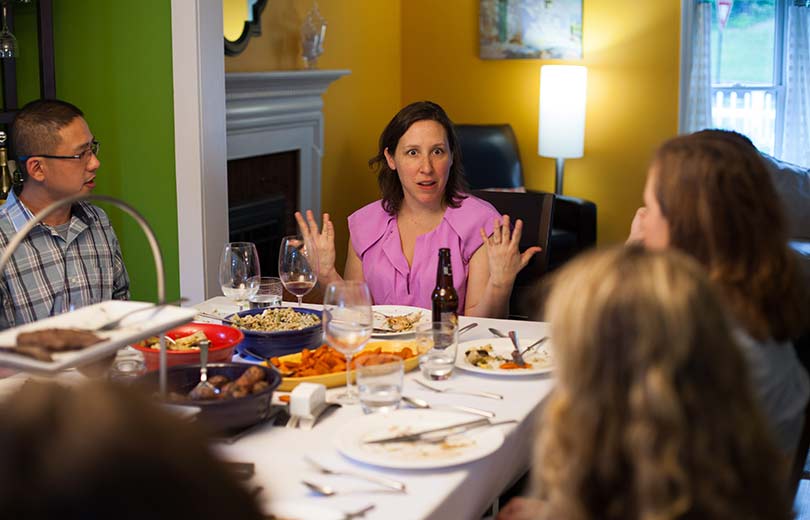
Here we’ve introduced this technology to our kids, and yet we want to somehow pull it back at times. Do you have regrets, and do you impose any limits or parental controls?
Tung: My son, if I let him, will watch a LOT of TV. He will just keep saying, “MORE, MORE, can I have MORE?” And so, I feel like that if I want him to have a well-balanced life and outlook, I do have to impose those limits. It’s so addicting to him. My daughter, she’s only 2, but … she just kind of watches it and then after a while, after ten minutes she just gets up. She’s done with it. What’s interesting is that the view of screen time is also evolving. I remember there was an NPR piece about how there is a difference between different types of screen time … that it’s ok for your kids to watch Sesame Street, that it’s like being in kindergarten for an hour. So it’s interesting that the thinking has evolved as the technology is evolving.
Bobby: I feel like the most difficult barrier that I have around setting limits around technology are from the generation previous to us. So, my mom, my dad, my wife’s mom … they don’t have as much of a thought about how there need to be limits around certain things, and it’s made me reflect on how much TV I watched as a kid, whereas my kids watch FAR less TV than I did as a child. Something that I’ve appreciated is just how much of an idea we have around the philosophy of setting limits and just knowing that it’s not healthy in many ways.
Jessica: We put it on a timer. My younger daughter likes her iPad. You asked if we have regrets. And yes, I do have regrets. My older one can totally handle it. But there was no way we could get the fourth grader an iPad mini and not get the first grader one. There was just no way that would ever go over ok. And the older one was ready for it. And we barely have to put any time restrictions on it for her. She just puts it down and then goes and does something else. Whereas my first grader is addicted.
I like that technology is in our lives, but I worry. For example, I said to myself, ‘Oh, we will never have devices at the table. Ever. We will be device-free.’ However, the problem is that now our device controls the music that we listen to, and so the device is at the table. You know, if we’re listening to Pandora and a song comes on that we don’t like, so we skip it, and then ‘ping,’ an email comes in, and then ‘ping,’ a Slack message from work, and it’s like it’s so connected all the time. Now I think we need to go old school and bring out a CD player.
Alyssa: With my sons and their friends, they’re getting into the age of the questionable video games. I have my doctorate in childhood development, so from one perspective, I would have thought that I would never have let my kids have those in my house, but seeing their friends who don’t have any of that, or their parents are not strict about it, those kids make me more nervous. I’d rather have it at my house because they mostly just want to talk about it, and at least I can see it. When they’re into that stuff it lasts for like a week, they just want to see it, and that’s the end of it. We had teenagers sleep over last Friday in our basement. We have Grand Theft Auto, and I don’t even think they played it.
Carrie: We deleted YouTube from all the iPads. My daughter has it on her computer, and we put a time limit on it. A parental control. YouTube is a rabbit hole, so we put a 30-minute limit on it. It shuts down.


Most laptops have parental controls built into system settings. Here are some tricks:
- Create a separate profile for your child and enable parental settings on that profile to specify which apps and websites that profile can access.
- You can also block certain sites, turn off access to the camera and microphone and restrict contact with certain people.
- Apple and Microsoft let you set time limits on computer use; however, (Chromebooks do not).
- Microsoft also offers a free family safety program that allows you to manage your family’s digital life across Windows PCs, Xbox and Windows mobile. Check it out here. With it you can geo-locate your children’s devices, get activity reports on online activity and block specific apps, games and websites, and set limits on screen time.
We try to keep tech’s influence in control, but at the same time, kids get to school and they have “the hour of code,” and they take tests on computers. It needs to be part of their life for them to be successful. How do we balance that?
Jessica: That makes me worried … because I’ve read a few articles that say, screen time is screen time. It doesn’t matter what they’re doing; doesn’t matter if it’s educational or not. And I’m thinking, at my kids’ school, they’re on the computer several times a day. They’re probably getting an hour, an hour and a half a day of screen time already, then they want to come home and do more screen time. And I’m thinking, ‘How many hours are they getting?’ And then I’m like, ‘Ugh, forget it; this is too hard. Fine, go do your Minecraft for half an hour.’
Carrie: In our family, my husband’s kind of proud of the fact that my daughter is very computer-savvy. She has one of his old laptops. She can get on her laptop (we have it very restricted, we have lots of parent controls), she can go to certain websites, she can play Minecraft with certain friends, or she can go to the American Girl doll site. Her school is the first one in our town to do testing on iPads. With keyboards. And there were a lot parents who were like, ‘Whoa. I don’t know how my kid’s going to do. They don’t know how to type on a keyboard.’ I didn’t even think about it … I’m not worried one bit. She’s going to cruise right in and she’s going to be fine.
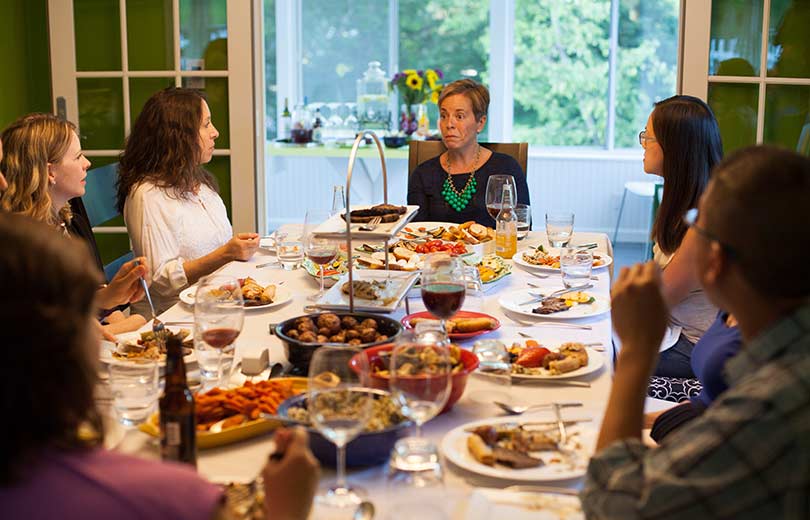
Does it feel like setting limits is arbitrary? How much do you base your decisions on just what you’re hearing, versus knowing your kids’ individual limits?
Zoe: We used to say, ‘Not more than two hours!’ But that’s changing, and there’s a lot of different information out there, and you’re not really sure, like, ‘Hmmm, is this just some sort of regurgitation of what it should be, or is there actual data?’ I mean, I get it, something innate tells you that, ‘My 3-year-old should not be watching Grand Theft Auto.’ But what if they sit down and watch 20 Daniel Tigers? What is good screen time? Does screen time at school count? I don’t know.
Jessica: It comes down to what’s right for your kids. My two girls are very different. My oldest is obsessed with women’s soccer and the national team. She will watch soccer games over and over. Her little brain is watching every move they’re making, and she’s thinking. “How can I do that on the field?” It’s not a passive zoning out in front of the screen. I’m ok with her watching a soccer game for two hours. That’s fine. But my little one, she’ll just sit there. She doesn’t even hear us. I have to be like, ‘Grace. GRACE. Ten-minute warning. Grace, what did I just say?’ And she’s like, ‘Huh?’
Kim: You were asking if we set limits, and we don’t. When they’re on it long enough we just say, ‘Alright stop,’ and we move on to the next thing. For YouTube, I must have once said, ‘You can’t go on YouTube without an adult.’ It wasn’t really a hard and fast rule, but one time they had friends over and I heard them tell their friends, ‘We can’t go on YouTube without an adult.’ We’ve talked a lot about inappropriate content and ads. If something comes on that they are not sure of, they’ll literally shield their eyes and say, ‘Mom, come look, we can’t see that!’ And I think, ‘Wow, these conversations are working.’ But it’s probably only going to work for so long while they’re at these ages.
Alyssa: That’s another big thing—it’s really dependent on the temperament of your kid. It makes a difference what they get out of it. Regarding screens in their rooms, even for that, I’m a bad offender. For one of my sons, school is stressful for him. He’s an anxious kid—he plays sports, he comes home, it’s 10:00 at night, and he doesn’t want to watch TV. He goes to his room, and he watches stuff on his iPad, but it’s like sports, or Vine videos. He just needs that down time for him to stay sane. School is really stressful for an anxious kid. So I do believe it that it’s not good to look at it before sleep, but yet he does every night and he’s fine.
Bobby: In one of the NPR studies on screen time, the two subgroups were kids that went away to camp and had no technology, and the kids who stayed home who had access to technology. The kids that went to camp were like really emotionally jazzed, and it’s like, was it the lack of technology, or the fact that they were away at a fun camp? I think a lot of the data is specious that we’re trying to make assumptions based on. Anyone rationally would say, of course, sitting in front of a TV or iPad for hours on end, that’s not healthy. But what it actually does to impact kids, I don’t think there’s really good data on that right now.
What are we so scared of? What are some of the things that concern you about kids being so connected?
Jessica: I do worry about social media. I am a social media manager and my job is to manage accounts that kids are on, and I see what they tweet and what they do and how dumb they are, and I’m thinking, ‘My God, my kid is going to want to do this.’ That’s the part of technology that scares me, because we could do things and screw up and everyone wouldn’t know about them two minutes later.
Alyssa: I took a media class as part of my doctoral program and one of the major things we discussed was ads. That to me is interesting, and being a good consumer of media, and I think those are skills they need to have when they’re on things like on YouTube.
Zoe: YouTube is like the Wild West.
Jessica: There’s a YouTube Kids offering with no ads. As a parent it frustrates me because my daughter can’t [always] find what she’s looking for, so I have to go to the regular YouTube. However, the good thing as a parent is that they are age-appropriate so you are not going to get the crazy whatevers popping up as you do with unfiltered YouTube.
Tung: My sister-in-law got my kids into opening those surprise eggs. I was like, ‘What are they?
Lindsay: For something like that, where they’re watching it passively, how are our kids critically thinking? How are they learning? How are they becoming problem solvers, working things out? I know we’re all doing the best we can, but it’s all so passive. [Surprise eggs] are the extreme, but even if you were watching Sesame Street, what are you getting out of it if they’re not doing any of the talking and any of the working it out?
Carrie: But do they have to be learning all the time? Think about what we watched. How much did we get out of Brady Bunch?
Zoe: We had tons of limits growing up, and I’m still addicted to TV. My mom got rid of cable when I was 16. So what did we do? We watched the same video nine hours a day. There’s yin and yang.
Making it Count – Positive Connections with Technology
It may be challenging, but it’s possible to find the human side of technology.
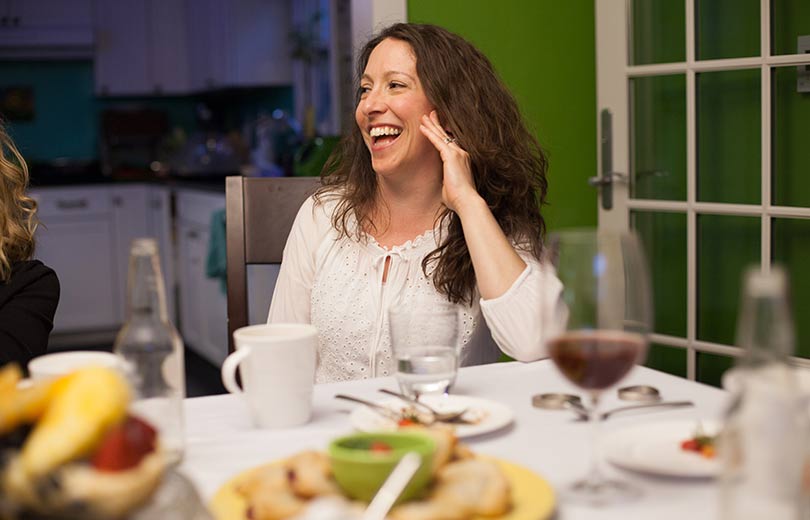
Speaking of those silly surprise eggs: How did your kids find the media they’re consuming? Does part of you want them to see these things, so they don’t miss out?
Jessica: We don’t want our kid to be the last one to know something … and we just had an experience where our daughter was at a party with a ton of other fifth grade girls, and all of a sudden a song came on, a popular song I don’t know what it was. And they all started doing this dance, and my daughter and four other girls were like, ‘What is going on?’ They were all on an app called musical.ly, and you can record yourself lip-syncing, and there are musical.ly stars, and you can vote, and all these girls knew this thing that my daughter didn’t know.
I always go to Common Sense Media—that’s my go-to to check if something’s appropriate. I saw that it gives access to adult content. And I was like, ‘I bet none of these parents know that.’ I’m not going to be the ‘You shouldn’t be letting your kids on that’ mom. I’m not going to tell anyone that. But there’s no way I’m letting my daughter.
Alyssa: I feel like it’s also passive versus active. My husband made it a point when my kids were in fourth or fifth grade where they watched every Simpsons in order on Netflix, and for every reference within The Simpsons, like if they referenced The Birds, they would go and watch The Birds. It was like a college course on The Simpsons. It’s like a relationship thing. The only time my daughter cares about the iPad is when she sits with the 13-year-old, and he’s scrolling on funny pictures of animals. I have no idea how they started, but it’s like their thing. And she’s dying laughing. So who really cares if she’s looking at some squirrel who wants an ice cream sandwich. You can’t get away from it so you find the positives.


With everyone in your house connecting to the Internet, your Wi-Fi signal may leave a lot to be desired. Here are a few quick fixes:
- Take your router out of that cupboard or closet. Containing your router deadens its signal, and simply bringing it out into the open into a central location can help improve signal strength dramatically.
- Keep it as far away as possible from other devices and appliances that might interfere with the signal.
- Plug Ethernet-enabled devices into your router directly when possible, to help take some of the load off the Wi-Fi network. Your smart TV and game console, for example, will probably work faster and more reliably over Ethernet, and by taking them off the Wi-Fi network you may see an overall speed increase.
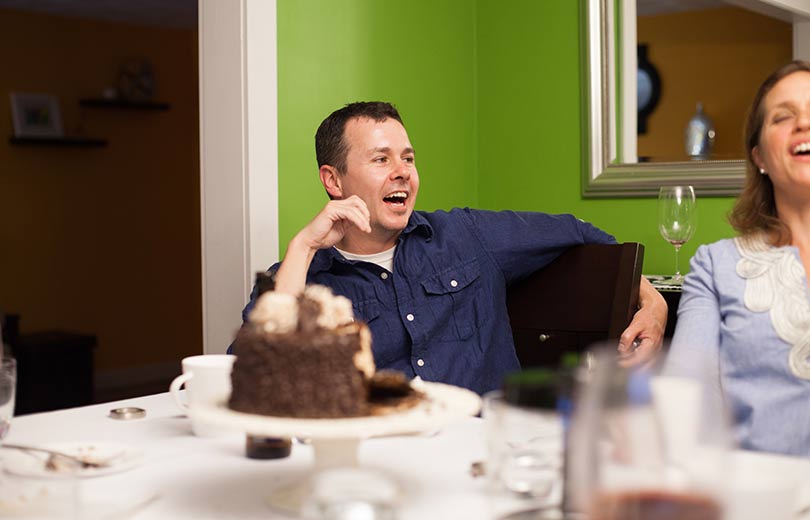
What are some of those positive connections we see with our kids and tech?
Jessica: One thing that’s nice is that mom gets to be in the picture again with selfies. You know, you’re always behind the camera taking pictures of the kids, and there’s no pictures [of moms], until I started thinking, ‘Oh! I can turn it around and take pictures of me with them.’ In 30 years I can be like, ‘Oh look, I was young once!’ There will actually be pictures of me with my girls.
Alyssa: And there’s FaceTime.
Carrie: Yes, like when my husband goes to India and my kids can see him and talk to him, albeit at bizarre times.
Alyssa: Or my 100-year-old grandmother. She can’t do it herself, but my mother will go to her house and she can see the kids that way.
Zoe: My husband and I are from huge families, and no one is from Massachusetts. My son wouldn’t know them … FaceTime is how you maintain relationships. He wouldn’t talk on the phone, but with FaceTime he can talk to them …
Carrie: We check out books from the library. It’s instant. She’s got books right there. She’s finishing the last Harry Potter book right now on the iPad.
Bobby: There was a day and age before now, where it was hard to access information. I remember doing book reports using encyclopedias, and it was hard to understand the stories of others, and I feel like we’re in an age where it’s incredibly easy and we see that access all the time. Our kids have much more access to the stories of others. It’s made a powerful footprint on their view of the world. That’s a powerful tool that technology has, in some ways, brought to the table. We forget sometimes to just really trust our kids.
Tung: But I also lament the stories that I read about when someone does something wrong, and then you get the social media pileup. Like the family in Orlando, or the [kid in the gorilla cage]. And you think, ‘What an evil outlet where people can just anonymously post …where's the humanity?
Lindsay: A lot of people have discussions they might not have the courage to have, though, that are good discussions.
Jessica: Facebook does open that up a lot for our kids. As a social media manager and not as a parent, I’m looking at accounts that kids are on. These kids, especially this one core chat group of gamers on this account I manage, they all congregate there, and they’re from all parts of the world. They could be total geeks, the most popular person in their class, you have no idea … but they’re all friends and they all come with this common interest.


If your router is more than a few years old, it may well be time for an upgrade. Upgrading from a single band router to a dual band router would definitely improve your network performance, and your Internet provider may be able to upgrade you free of charge.
If you have a large house, chances are that your signal won’t be strong and you’ll need WiFi repeaters or a range extender. These plug into a power outlet or a second Ethernet port to help push your signal further through the home.
For better or worse, technology will only continue to grow and change. How do you see your kids adapting?
Carrie: I think it goes back to what Bobby said. Sometimes we just don’t trust our kids enough. I actually have a lot of trust in my daughter. She just got this karaoke machine thing and it works with Bluetooth, and we had this old iPhone, and I showed her how to turn on Spotify. She has her own Spotify playlist. But I said to her, if you see anything that has a little red square with an E on it, just ask me first before you start diving into it.
Bobby: What our niece does on Video Star… she’s so talented. She creates these videos and edits them together. It’s an app, and they’re so good. Like legit good. She’s 9, and she’s producing these videos, lip-syncing and adding effects.
Alyssa: My son just had to do a project for school, and they made a rap video [on the iPad]. They were voted most fun project, and it was great. I didn’t know he knew how to do that. The quality of it is crazy good. They did it in one afternoon in an hour after school.
Carrie: Quinn watches this new show, Kickin’ It, and it’s about karate. And now she practices karate while she watches TV. So is that a bad thing? She probably never would have tried karate if not for that.
Food for Thought
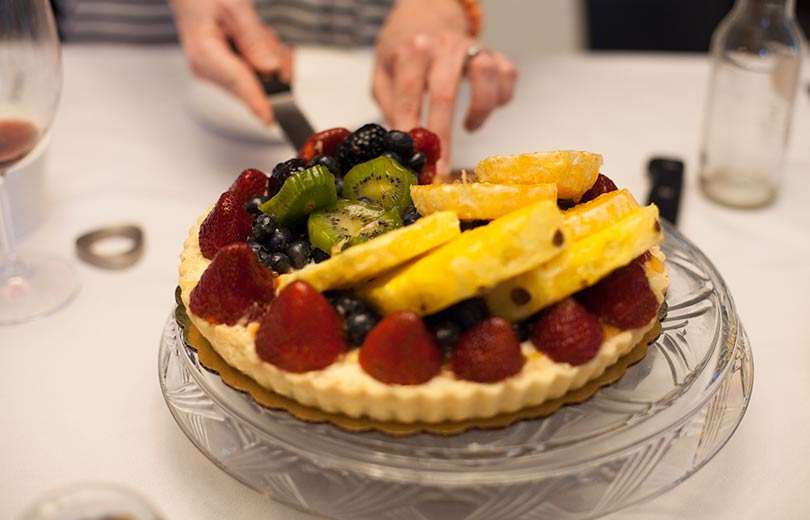
Today’s conversations about technology fuel tomorrow’s innovations.
As we await the new guidelines from the AAP and the latest technology treats that are surely around the corner, it’s clear that in the meantime we’re hungry for quality products for our kids, and helpful ways in which we can keep an eye on how they use them.
